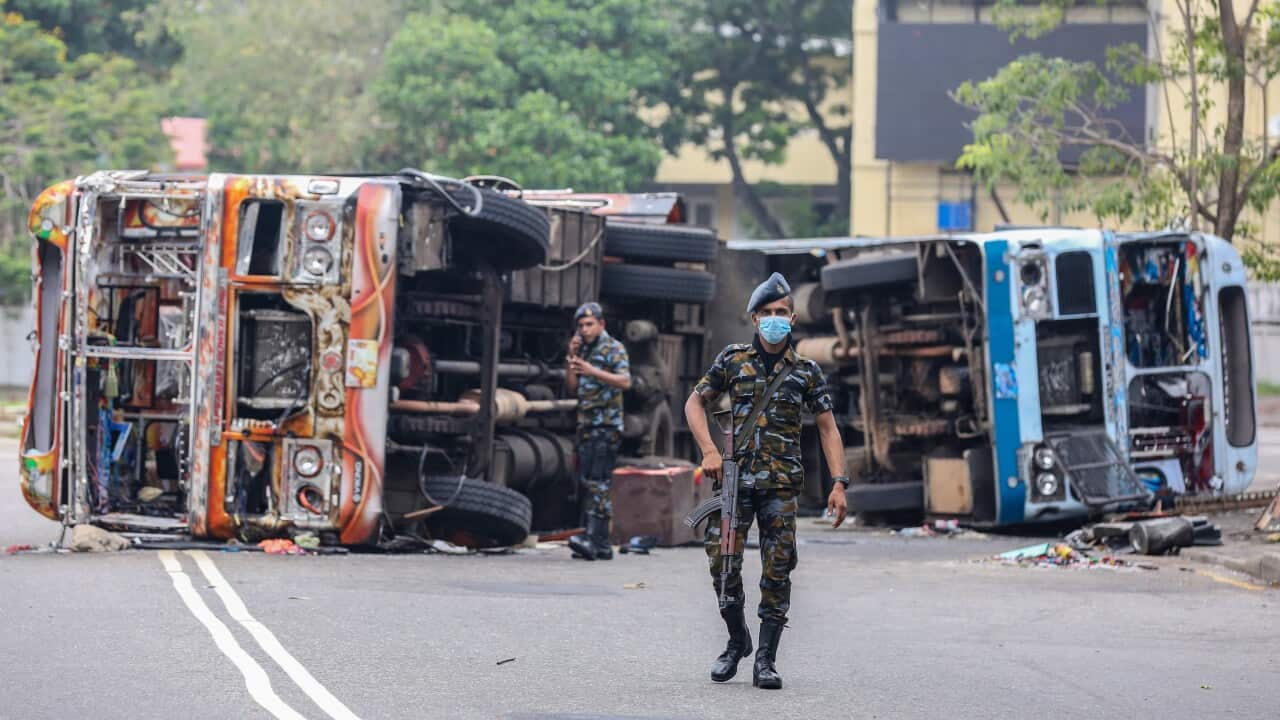Sri Lankan authorities issued shoot-on-sight orders on Tuesday to quell unrest that has seen buildings and vehicles set ablaze a day after the island was rocked by deadly violence and rioting.
With thousands of security forces enforcing a curfew, the defence ministry said troops "have been ordered to shoot on sight anyone looting public property or causing harm to life".
On Monday, government supporters with sticks and clubs attacked demonstrators in Colombo protesting peacefully for weeks over a dire economic crisis and demanding President Gotabaya Rajapaksa's resignation.
Mobs then retaliated across the country late into the night, torching dozens of homes of ruling-party politicians and trying to storm the prime minister's official residence in the capital.
Police said on Tuesday eight people had died.

Police inspect the debris of the torched tents of anti-government protesters. Source: AAP / CHAMILA KARUNARATHNE/EPA
A luxury hotel said to belong to a Rajapaksa relative was set on fire on Tuesday evening on the edge of the Sinharaja rainforest.
And police shot into the air at two locations to disperse mobs trying to burn vehicles.
Earlier, a crowd had attacked and set fire to a vehicle carrying Colombo's most senior policeman.
Officers fired warning shots and sent in reinforcements to rescue Senior Deputy Inspector-General Deshabandu Tennakoon, who was rushed to hospital but later released.
In another sign of deteriorating security, vigilante groups blocked the main road to Colombo airport to check for any Rajapaksa loyalists trying to leave the island, witnesses said.
As well as those killed, more than 225 people were injured on Monday, which also saw the resignation of Prime Minister Mahinda Rajapaksa.
His departure, however, failed to quell public anger, with his brother still president and wielding widespread powers including command over security forces.
Mr Rajapaksa had to be rescued in a pre-dawn military operation after thousands of angry protesters stormed his official residence overnight and lobbed petrol bombs.
Protester Chamal Polwattage said he expected demonstrations to swell again and vowed they would not leave "until the president goes".
"People are angry about the attacks launched against us yesterday... We have a lot of volunteers bringing food and water for us," the 25-year-old told AFP.
Authorities said the curfew will be lifted Wednesday morning, with government and private offices, as well as shops and schools, ordered to remain shut on Tuesday.
US Ambassador Julie Chung tweeted that Washington condemned "the violence against peaceful protesters" and called on the Sri Lankan "government to conduct a full investigation, including the arrest & prosecution of anyone who incited violence".
Politician shot dead
Anti-government protesters defied police to retaliate against government supporters for the attacks late into Monday night.
Outside Colombo, ruling party politician Amarakeerthi Athukorala shot two people — killing a 27-year-old man — after being surrounded by a mob of anti-government protestors, police said.
"He then took his own life with his revolver," a police official told AFP by telephone.
Mr Athukorala's bodyguard was also found dead at the scene, police said.
Another ruling party politician who was not named opened fire on protesters, killing two and wounding five in the deep south of the island, police added.

Government supporters and police confront each other outside Sri Lanka's president's office in Colombo, on 9 May, 2022. Source: Getty, AFP / Ishara S. Kodikara
Several Rajapaksa homes were torched in different parts of the country, while a family museum in their ancestral village was trashed.
Doctors at the main Colombo National Hospital intervened to rescue wounded government supporters, with soldiers breaking open locked gates to ferry in the wounded.
"They may be murderers, but for us they are patients who must be treated first," a doctor shouted at a mob blocking the entrance to the emergency unit.

Sri Lanka's Prime Minister Mahinda Rajapaksa.
Unity government
Mahinda Rajapaksa, 76, said he was resigning to pave the way for a unity government.
But it was unclear if the opposition would join any unity administration, having before refused to govern with any members of the Rajapaksa family.
Under Sri Lanka's political system, even with a new unity government, the president will have the power to appoint and fire ministers as well as judges, and enjoy immunity from prosecution.
"Unless President Rajapaksa steps down, no one — whether the masses in the streets or key political stakeholders — will be appeased," analyst Michael Kugelman from the Wilson Center told AFP.
The protests came after the coronavirus pandemic hammered the island's vital income from tourism and remittances, which starved the country of foreign currency needed to pay off its debt.

Policemen carry an injured man during a clash between government supporters and demonstrators outside Sri Lanka's president's office in Colombo, on 9 May, 2022. Source: Getty, AFP / Ishara S. Kodikara
In April, Sri Lanka announced it was defaulting on its $51 billion (A$73 billion) foreign debt.
It is unclear what President Rajapaksa's next move will be in the face of the protests, according to Akhil Bery of the Asia Society Policy Institute.
Aside from following his brother in resigning, he could appoint a caretaker government -- before then quitting -- deploy the military and police to suppress the protests, or try to wait for them to "die down naturally", Bery told AFP.
But whatever happens, the next government will have to take "unpopular decisions" to repair the devastated economy, he said.
Any bailout from the International Monetary Fund — currently under negotiation — would mean "higher taxes and less government spending, which is a politically toxic combination," he added.









